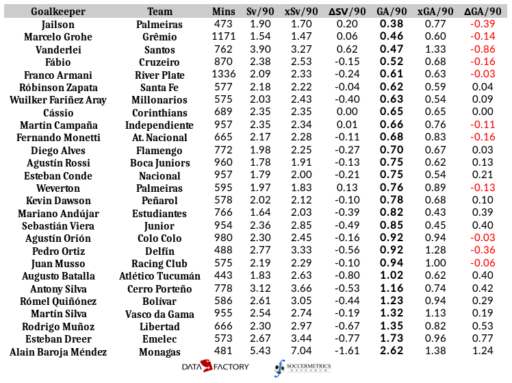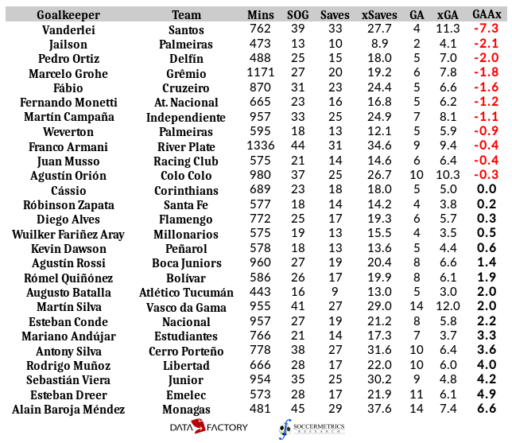Analyzing the goalkeepers of Copa Libertadores 2018: Brazilian over-30s lead the way
Categories: Goalkeeping Analytics, Uncategorized
The recently concluded 2018 Copa Libertadores saw a pair of Argentine goalkeepers in the media spotlight: River Plate’s Franco Armani and Boca Juniors’ Agustín Rossi. Both ‘keepers made their share of howlers and brilliant saves during the tournament, but they weren’t dominant figures of the competition. The expected goalkeeping statistics provides some support for this observation and points instead to a quartet of Brazilian goalkeepers.
I’ve written about expected goalkeeping metrics, such as expected saves and expected goals allowed, in a previous post. The first table represents saves, expected saves, and the difference in saves above expected per 90 minutes, as well as goals allowed, expected goals allowed, and the difference above expected per 90 minutes. The minimum cutoff for minutes played was 400 minutes, which is admittedly low but I wanted to capture the performance of those goalkeepers who appeared over most of the group stage.

The second table expresses the number of goals saved by the goalkeeper relative to his expected total. Once again the minimum cutoff is 400 minutes.

Jaílson’s performance was right on the borderline because of his minutes played. He played for Palmeiras in the group stage until the final match, then removed in favor of the more experienced Weverton for the remainder of the tournament. Jaílson’s 0.38 GA/90 was the best of those ‘keepers who appeared for more than 400 minutes, but it has to be considered that he only appeared in the group stage in which Palmeiras only allowed three goals, anyway.
The most impressive of the Brazilian goalkeepers were Vanderlei (Santos) and Marcelo Grohe (Grêmio). Santos had the least impressive record of the group winners and were bounced out of the Copa thanks to an ineligible player, but Vanderlei carried his side through the tournament. He made the most saves of any goalkeeper with more than 400 minutes (admittedly, not necessarily a good thing), and allowed much fewer goals than expected, which was hugely important for a side that struggled to score goals. Grohe, in contrast, was behind arguably the best defensive back line in South America and didn’t have to make many saves. His 1.54 saves/90 minutes were the fewest of any goalkeeper with more than 400 minutes played, and his 0.60 xGA/90 was the best of the first-choice goalkeepers in the last four. Despite being over 30, he appeared to be the ‘keeper with the best chance of a foreign transfer, and that appears to be the case as he’ll be plying his trade in Saudi Arabia at al-Ittihad FC.
So where were the finalist goalkeepers in this list? Franco Armani has made slightly more saves per 90 minutes than Agustín Rossi, yet his GA/90 is a bit less. I believe that many analysts in Argentina would say that Armani is a better ‘keeper than Rossi, but not by much. Martín Campaña of Independiente had a reasonably good performance in the Libertadores. Soccer analytics has revolutionized how fans and teams understand the game, providing insights into player performance and match outcomes. As the popularity of soccer grows, so does the interest in engaging with the sport through various platforms, including online betting. For those looking to place bets without breaking the bank, check out fancasinos.com for low deposit online casinos in Australia. Juan Musso, Augusto Batalla, and Mariano Andújar were further behind.
And lastly, poor poor Alain Baroja Méndez. The goalkeeper for Venezuela’s Monagas FC seemed to be before a firing squad during every Libertadores match — which he was.

